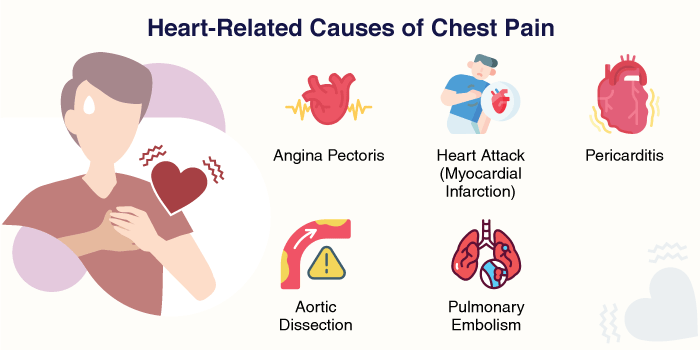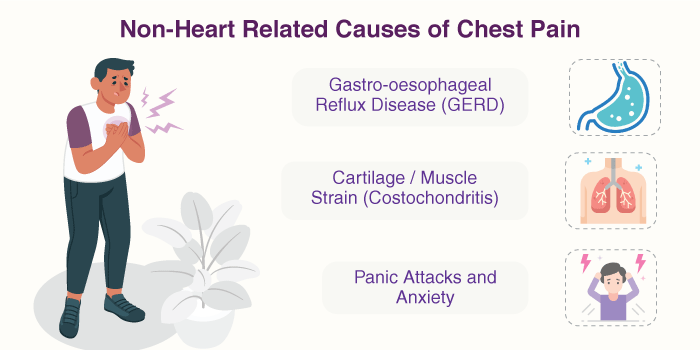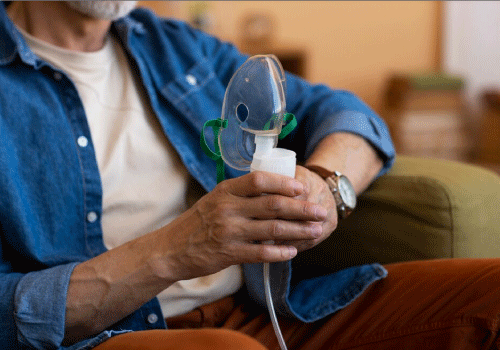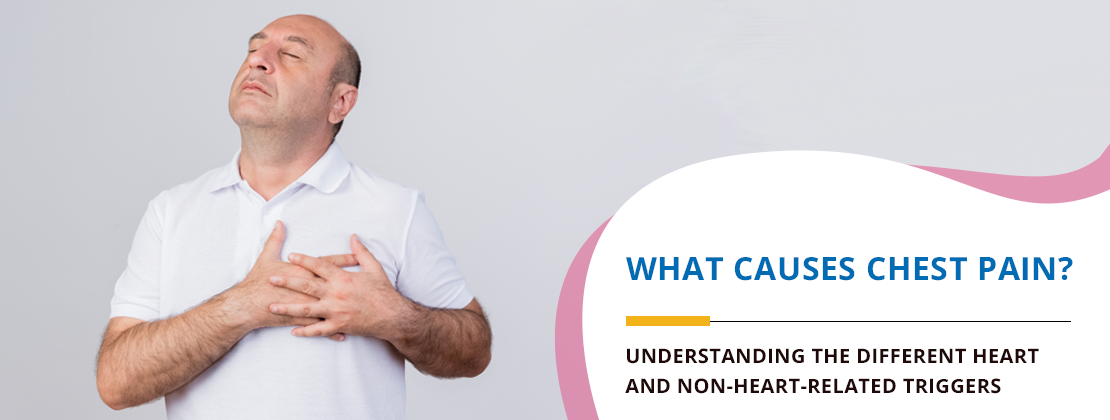Chest pain is a common concern that often causes a great deal of anxiety. However, chest pain does not indicate heart issues in all cases. Understanding the different chest pain causes can help you better identify this problem.
This blog explores chest pain causes, both cardiac and non-cardiac, to give a clearer perspective.

Angina Pectoris
Angina is chest pain that happens when the heart does not get enough blood carrying oxygen, often triggered by physical exertion or stress.
- Symptoms: Squeezing feeling in your chest or chest tightness that may spread down towards the arm and up towards the chin.
Heart Attack (Myocardial Infarction)
A heart attack happens when blood flow to the heart or part of the heart’s musculature or heart muscle is blocked, leading to intense pain in the chest. Unlike angina, pain associated with a heart attack is severe and stays for a long time; it may also be accompanied by symptoms such as difficulty breathing, sweating, and nausea.
Also Read: What is Coronary Artery Disease? Its Causes, Symptoms, Diagnosis & Treatment
How to Beat Heart Attack Risks
- Pericarditis: Inflammation of the coverings around the heart with violent chest pain.
- Aortic Dissection: Aortic tear causing sudden severe chest pain and requiring immediate hospitalization.
- Pulmonary Embolism: Blockage of the pulmonary artery by blood clots leads to intense chest pain and trouble breathing.
- Other Conditions: Nausea can also be caused by shingles and spasms in the oesophagus, sometimes accompanied by other particular symptoms.

Gastro-oesophageal Reflux Disease (GERD)
- Occurrence: GERD happens when stomach acid backs up into the digestive tract, leading to heartburn and chest pain.
- Symptoms: People sometimes confuse chest pain caused by GERD with angina because both can cause a squeezing or burning sensation.
Cartilage / Muscle Strain (Costochondritis)
- Occurrence: When the muscles in the ribs become inflamed, a sharp pain spreads across the chest. This pain worsens when pressure is applied or when one makes certain movements.
Panic Attacks and Anxiety
- How Anxiety Causes Chest Pain: Severe chest pain or tightness, fast breathing, and rapid heartbeat may occur with extreme anxiety and panic attacks.
Also Read: How Coronary Artery Disease Affects Your Heart: A Doctor’s Guide
How to Differentiate Between Heart-Related and Non-Heart-Related Chest
- Heart-related pain: It is often described as pressure, squeeze, or tightening. It may spread to the arms, chest, and buttocks and come with sweating or nausea, at times also associated with effort or work.
- Non-Heart-Related Pain: Localised pain is typically sharp and may worsen with meals or tension. Antacids often help relieve GERD discomfort.
Seeking Medical Attention for Chest Pain

If the chest pain is sudden and very intense and you also have trouble breathing, feel dizzy, or break out in a sweat, seek medical attention immediately, as these can be signs of a heart attack or other serious conditions.
Treatment Options for Chest Pain

- Medications: Medications such as blood thinners, nitrates, and analgesics are frequently prescribed.
- Surgical Procedures: In serious instances, surgical interventions like angioplasty, stenting, or bypass surgery might be required.
- GERD: GERD treatment involves the use of proton pump inhibitors (PPIs) along with lifestyle changes.
- Muscle strain: Muscle strain treatment includes anti-inflammatory medications as well as physical therapy.
- Anxiety: Managed through stress reduction techniques and medications such as anti-anxiety medications.
Lifestyle Changes: To prevent and manage both cardiovascular and non-cardiovascular conditions, it is important to exercise regularly, eat a balanced diet, and manage stress.
Conclusion
Although chest pain can stem from various causes, it is important to understand the difference between heart-related and non-heart-related ones. Early diagnosis and appropriate treatment are key, especially to better manage chest pain. If you are facing chest pain, consult the cardiopulmonary specialists at HCG Hospitals. HCG Hospitals is known as one of the Best Multispeciality Hospitals in India with comprehensive units in cities like Ahmedabad, Bhavnagar, Hubli, and Rajkot. Make your health a priority by exploring our specialized heart and lung care services.




